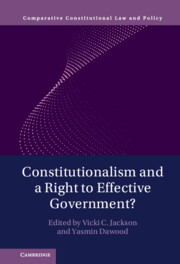Book contents
- Constitutionalism and a Right to Effective Government?
- Comparative Constitutional Law and Policy
- Constitutionalism and a Right to Effective Government?
- Copyright page
- Dedication
- Contents
- Tables
- Contributors
- Acknowledgments
- Part I Introduction
- Part II What Are Constitutions For?
- Part III Positive Rights and Rights to Effective Self-Government
- Part IV The Role of Courts in Building State Capacity and Promoting Effective Self-Government While Protecting Rights
- 9 The Unconstitutional State of Affairs Doctrine
- 10 Courts and Effective Governance
- 11 The New Managerialism
- Part V Executive and Administrative Constitutionalism in Effective Democratic Government
- Part VI Legislatures, Representation, and Duties of Effective Self-Government
- Part VII Politics, Sociology, Media, and Corruption as Contexts for Constitutionalism and Governance
- Index
9 - The Unconstitutional State of Affairs Doctrine
from Part IV - The Role of Courts in Building State Capacity and Promoting Effective Self-Government While Protecting Rights
Published online by Cambridge University Press: 20 October 2022
- Constitutionalism and a Right to Effective Government?
- Comparative Constitutional Law and Policy
- Constitutionalism and a Right to Effective Government?
- Copyright page
- Dedication
- Contents
- Tables
- Contributors
- Acknowledgments
- Part I Introduction
- Part II What Are Constitutions For?
- Part III Positive Rights and Rights to Effective Self-Government
- Part IV The Role of Courts in Building State Capacity and Promoting Effective Self-Government While Protecting Rights
- 9 The Unconstitutional State of Affairs Doctrine
- 10 Courts and Effective Governance
- 11 The New Managerialism
- Part V Executive and Administrative Constitutionalism in Effective Democratic Government
- Part VI Legislatures, Representation, and Duties of Effective Self-Government
- Part VII Politics, Sociology, Media, and Corruption as Contexts for Constitutionalism and Governance
- Index
Summary
Constitutional adjudication routinely works against the backdrop of the assumption of a functioning government. Courts dispose of individual cases by declaring a specific violation and issuing a specific remedy. They do not go beyond the individual case because, by design, the political branches – legislatures and executive branches – are supposed to protect, respect, and ensure basic rights in most cases that do not reach the courts.
However, this is not the case with massive and structural violations of rights. In peaceful times, massive violations of rights are usually not a product of malfeasance or bad faith; they are the result of precarious institutional capacity and dysfunctional policies, political processes, or systems of government. In other words, they are the consequence of specific instances of a lack of effective governance.
Keywords
- Type
- Chapter
- Information
- Constitutionalism and a Right to Effective Government? , pp. 107 - 123Publisher: Cambridge University PressPrint publication year: 2022

